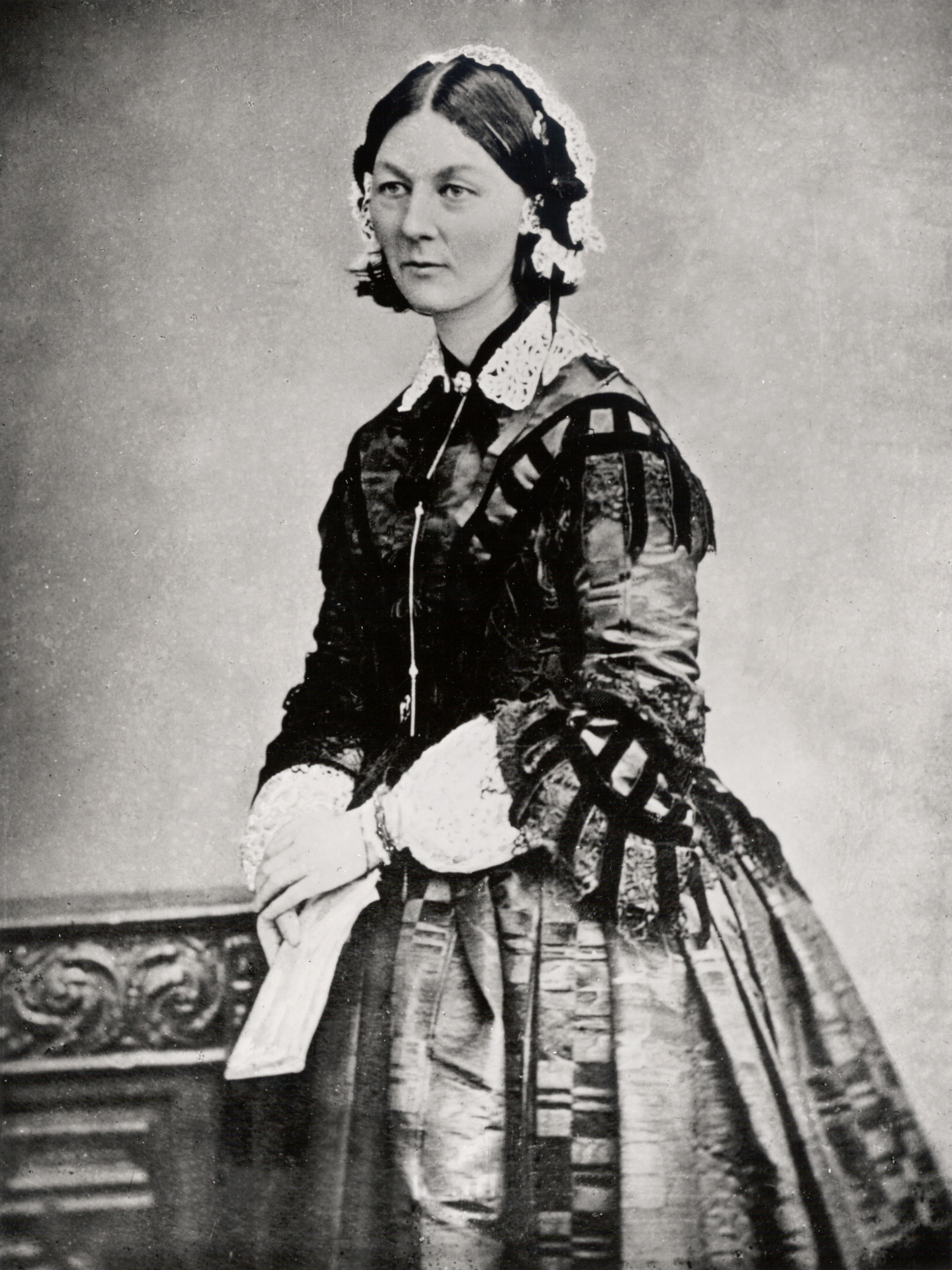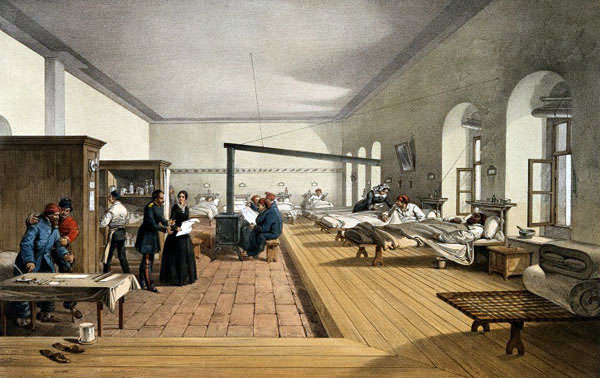When I was 11 or 12, my grandparents asked me to help them sort all of their books in their dungeon of a basement. In the midst of the dusty stacks, I found a children's set of biographies, including one on Florence Nightingale. I remember sitting down and reading it right there. I loved the poetic beauty and ethereal image the nickname "The Lady with the Lamp" called up and fell in love with Florence.
"Malta was but a brief halting-place on the way to the Crimea, and we landed at Balaclava the first week of November 1854. The 14th [Regiment] was soon moved to the front, and posted to the Third Division, commanded by General Sir Richard England. Our chief duty for many months to come was in the trenches day and night, and my most vivid recollection of that dreary time is snow, everlasting snow, throughout the bitterly severe winter of 1854-55. Owing to our hasty departure from Malta we, like the rest of the army, were ill-provided with suitable clothing, and I remember the joy with which I received at last a fur coat and a pair of long brown boots sent out from England, ready-made and not exactly a perfect fit; but to me at that time they were beyond all price. I kept well, and was as happy as the day was long (the days were rather long in the trenches); but soon after Sebastopol was evacuated by the Russians on the 8th September 1855, I had a very bad turn of Crimean fever, and was sent down to the hospital at Scutari, where my head was shaved, and for some weeks it seemed doubtful how matters would end for me. Our chief interest in hospital was to watch for Florence Nightingale as she passed through the wards with a gentle words for all,--a weary time until I improved and was invalided to England towards the end of 1855. My Crimean experience was at the age of from nineteen to twenty, and, looking back to such distant times, it seems to me nowadays as if those scenes had been in another world, and I feel myself a veritable Rip Van Winkle as I muse upon those far-off days and wonder how many officers still survive who landed at Balaclava with the old Fighting Fourteenth on that November day in 1854."
Sadly, he didn't mention anything else about Florence.
Florence herself landed in Scutari in early November of 1854, and discovered that the medical conditions there were absolutely horrendous. The "hospital" of that time lacked many of the basics we consider integral to modern hospitals, including proper hygiene, medication, and bedding. "The hospital sat on top of a large cesspool, which contaminated the water and the building itself. Patients lay in their own excrement on stretchers strewn throughout the hallways. Rodents and bugs scurried past them. The most basic supplies, such as bandages and soap, grew increasingly scarce as the number of ill and wounded steadily increased. Even water needed to be rationed. More soldiers were dying from infectious diseases like typhoid and cholera than from injuries incurred in battle.(Florence Nightingale Biography)
It was Florence's responsibility to work with and oversee the 38 other nurses who arrived with her as they cleaned and dressed wounds, cooked and fed the soldiers in their wards, and in general, kept everything much more sanitary. In many ways, Florence and her nurses were expected to be glorified house maids.
 "An article published about her in the Times newspaper on Thursday 8 February 1855, which reads: ‘She is a “ministering angel” without any exaggeration in these hospitals, and as her slender form glides quietly along each corridor every poor fellow’s face softens with gratitude at the sight of her. When all the medical officers have retired for the night, and silence and darkness have settled down upon these miles of prostrate sick, she may be observed alone, with a little lamp in her hand, making her solitary rounds.’ The mention of the miles of sick relates to contemporary reports that the wards at Scutari stretched for four miles." (National Archives)
"An article published about her in the Times newspaper on Thursday 8 February 1855, which reads: ‘She is a “ministering angel” without any exaggeration in these hospitals, and as her slender form glides quietly along each corridor every poor fellow’s face softens with gratitude at the sight of her. When all the medical officers have retired for the night, and silence and darkness have settled down upon these miles of prostrate sick, she may be observed alone, with a little lamp in her hand, making her solitary rounds.’ The mention of the miles of sick relates to contemporary reports that the wards at Scutari stretched for four miles." (National Archives)
While in Scutari, she began researching and advocating for reforming medical hospitals, particularly the living conditions of the soldiers. After she returned to England, she worked to improve sanitation in both hospitals and regular homes, and began the first modern nursing school.
Sources:
"Fox-Hunting Recollections" Sir Reginald Graham, Bart. (available for free on Google Books)
http://www.nationalarchives.gov.uk/education/resources/florence-nightingale/
https://www.biography.com/scientist/florence-nightingale
https://www.britannica.com/biography/Florence-Nightingale
https://www.florence-nightingale.co.uk/?v=7516fd43adaa
https://en.wikipedia.org/wiki/Florence_Nightingale
Florence herself landed in Scutari in early November of 1854, and discovered that the medical conditions there were absolutely horrendous. The "hospital" of that time lacked many of the basics we consider integral to modern hospitals, including proper hygiene, medication, and bedding. "The hospital sat on top of a large cesspool, which contaminated the water and the building itself. Patients lay in their own excrement on stretchers strewn throughout the hallways. Rodents and bugs scurried past them. The most basic supplies, such as bandages and soap, grew increasingly scarce as the number of ill and wounded steadily increased. Even water needed to be rationed. More soldiers were dying from infectious diseases like typhoid and cholera than from injuries incurred in battle.(Florence Nightingale Biography)
It was Florence's responsibility to work with and oversee the 38 other nurses who arrived with her as they cleaned and dressed wounds, cooked and fed the soldiers in their wards, and in general, kept everything much more sanitary. In many ways, Florence and her nurses were expected to be glorified house maids.
 "An article published about her in the Times newspaper on Thursday 8 February 1855, which reads: ‘She is a “ministering angel” without any exaggeration in these hospitals, and as her slender form glides quietly along each corridor every poor fellow’s face softens with gratitude at the sight of her. When all the medical officers have retired for the night, and silence and darkness have settled down upon these miles of prostrate sick, she may be observed alone, with a little lamp in her hand, making her solitary rounds.’ The mention of the miles of sick relates to contemporary reports that the wards at Scutari stretched for four miles." (National Archives)
"An article published about her in the Times newspaper on Thursday 8 February 1855, which reads: ‘She is a “ministering angel” without any exaggeration in these hospitals, and as her slender form glides quietly along each corridor every poor fellow’s face softens with gratitude at the sight of her. When all the medical officers have retired for the night, and silence and darkness have settled down upon these miles of prostrate sick, she may be observed alone, with a little lamp in her hand, making her solitary rounds.’ The mention of the miles of sick relates to contemporary reports that the wards at Scutari stretched for four miles." (National Archives)While in Scutari, she began researching and advocating for reforming medical hospitals, particularly the living conditions of the soldiers. After she returned to England, she worked to improve sanitation in both hospitals and regular homes, and began the first modern nursing school.
Sources:
"Fox-Hunting Recollections" Sir Reginald Graham, Bart. (available for free on Google Books)
http://www.nationalarchives.gov.uk/education/resources/florence-nightingale/
https://www.biography.com/scientist/florence-nightingale
https://www.britannica.com/biography/Florence-Nightingale
https://www.florence-nightingale.co.uk/?v=7516fd43adaa
https://en.wikipedia.org/wiki/Florence_Nightingale








No comments:
Post a Comment